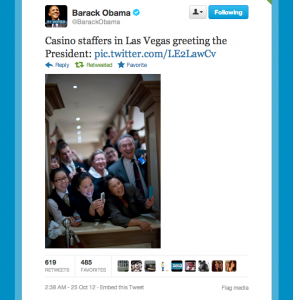To me, it’s kind of funny that less than two weeks before Election Day, any campaign, Repub or Dem, would choose to have their candidate try to give a “major” speech, but then the Romney campaign has often operated by their own book. In Iowa today Mitt gave a speech on the economy billed as “major” which seems to have fallen way short in the policy and news departments. Below is a round-up of progressive and mainstream comment on it, rounded up and send out by the Obama campaign (pasted in below from the campaign’s email to its press list). The round-up was delivered just ahead of notice the campaign sent out for a conference call with Lawrence Summers and Rep. Chris Van Hollen, in response to Mitt’s speech. The two of them vigorously knocked down the familiar claims Romney made in his speech, which was a recycling of rhetoric and Repub boilerplate.
Shorter Lawrence Summers, paraphrased: Repeating it all over again doesn’t make it add up. Saying it louder doesn’t make it true.
Van Hollen, in Ames, Iowa, paraphrased: 80 business execs yesterday signed a letter requesting the next president make a serious effort to tackle our country’s budget and revenue issues. Only one candidate has a serious s plan for doing so, President Obama. Only his plan is a serious response to the concerns of these business leaders.
The Reviews are in on Romney’s “Major” Economic Speech
Ali Velshi: “They said this was major economic news. There wasn’t a piece of economic news in it.”
Gloria Borger: “This wasn’t so much about, you know, specific policy prescriptions. Nothing new right now.”
Jim Acosta: “Yes, there’s not really a whole lot that’s new inside these remarks here, if you take a look at these remarks in terms of what he said out here today.”
Brooke Baldwin: “I didn’t hear a lot new in the speech. I’m guessing you didn’t hear much new in the speech either.”
Jim Acosta @jimacostacnn Owner of Iowa company where Mitt Romney delivering speech on economy received stimulus funds: http://on.cnn.com/QKbZg9
ThinkProgress @thinkprogress Romney makes closing economic argument at firm that benefited substantially from stimulus funds http://thkpr.gs/ScsELv
Sam Youngman @samyoungman Looking at excerpts from Romney’s “major” econ address. Looks like his stump speech to me.
Ari Shapiro @Ari_Shapiro Romney campaign releases excerpts of today’s “major economic speech.” So far looks a lot like the stump speech he’s been giving this week.
Benjy Sarlin @BenjySarlin So….what’s the news in this major Romney speech so far.
Ali Velshi @AliVelshi I’ll rejoin @SuzanneMalveaux on @CNN after Romney’s econ speech from. This speech isn’t delivering specifics.
Kathie Obradovich @KObradovich Romney about 9 minutes into his speech and it has been uniformly negative in terms of bashing Obama. #romneyia
Molly Ball @mollyesque So far Romney’s big speech on the economy is all about Obama.
Sam Stein @samsteinhp With all the talk of bi-partisanship, has anyone asked Romney campaign if he still looks back at himself as a severely conservative gov?
Justin Wolfers @justinwolfers Turns out that Romney’s “big economic speech” today, was just a placeholder, so that he could go on the attack if the GDP numbers were bad.
Jonathan Cohn @CitizenCohn It’s been a while since I listened to a full Romney speech. Sort of awe-inspiring to hear all of deceptions strung together.
Eric Kleefeld @EricKleefeld Mitt Romney delivers major economic speech, declares substantively that he loves America.
Molly Ball @mollyesque Apparently difference between a Major Romney Address & a regular Romney speech is whether he enters to “Air Force One” or “Born Free.”
Elizabeth Drew @ElizabethDrewOH There Mitt goes again: He will create the 12 million jobs that are going to happen anyway. Who is going to speak up?
Travis Waldron @Travis_Waldron There was nothing major about that speech.



